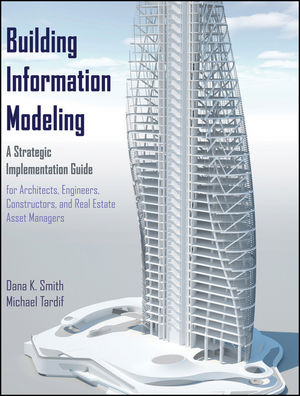Building Information Modeling: A Strategic Implementation Guide for Architects, Engineers, Constructors, and Real Estate Asset ManagersISBN: 978-0-470-25003-7
Hardcover
216 pages
April 2009
 This is a Print-on-Demand title. It will be printed specifically to fill your order. Please allow an additional 10-15 days delivery time. The book is not returnable.
|
||||||
Foreword xi
Introduction xv
Chapter 1 Building Industry Challenges and Opportunities 1
Global Trends in Supply and Demand 2
Benchmarking Construction Productivity 3
Construction Productivity Metrics 6
Benchmarking Building Performance 8
Converting Inefficiency and Waste into Profit 10
Benchmarking Waste 11
Identifying Business Opportunities 12
Emerging Business Strategies 15
Choosing the Right Tools, Deploying the Right Tool Suites 16
The BIM Value Proposition 19
Process Engineering 20
Thinking Like an Owner 22
Building Performance Metrics 23
New Metrics for Real Property Valuation 23
Chapter 2 BIM Implementation Strategies 27
Leaving the CAD Era Behind 28
A Systems Approach to BIM Implementation 29
Avoiding Ideological Pitfalls 30
Aligning a BIM Implementation Strategy with Technology Trends 32
Assessing Fundamental Risks 33
Fostering a Culture of Information Stewardship 33
Managing Culture Change 35
Using Technology to Build Trust and Mitigate Risk 36
Maintaining Data Exchange Capabilities 37
Assessing Team Capabilities 41
Managing Expectations 42
Measuring Progress toward Strategic Goals 44
Toward a New Business Paradigm 54
Chapter 3 Business Process Reform 57
Managing Innovation Risk 58
The Imperative of Change 59
Innovation Management Strategies 60
The “I” in BIM 62
Business Reform Strategies 63
Industry-wide Reform Efforts 64
Industry Standards and Innovation 66
The Industry Standards Landscape 68
Aligning Business Strategies with Industry Standards 70
Integrating Information Gathering into the Business Process 72
Leadership and Vision 75
Engaging Business Partners 77
Business Process Modeling 78
Business Process Modeling Case Study 82
Managing Change 83
Populating the Building Information Model 87
Chapter 4 BIM-Based Enterprise Workflow 89
BIM Implementation Fundamentals 90
Sidebar: Integrating Data Collection with Business Processes 94
Business Operations and BIM 98
Marketing/Business Development 99
Human Resources 101
Finance 102
Information Technology 104
Operations 105
Workflow Visualization 108
Chapter 5 The Building Life Cycle 111
Life Cycle Views of Building Information 111
The Feasibility, Planning, and Development View 115
The Design and Construction View 116
The Operations and Maintenance View 118
The Ownership and Asset Management View 123
Chapter 6 Building Information Exchange Challenges 129
Sidebar: Data, Information, Knowledge, and Wisdom 130
Information Management 131
Sidebar: Case Study: Information Management 134
Information Provenance 135
Information Maturity 137
Sidebar: The Wayback Machine: Archiving the Web 138
Information Content Decay 140
Information Electronic Degradation 140
Information Integrity and Continuity 141
Information Transparency, Accessibility, and Security 143
Information Flow 144
The Life Cycle of Information 146
Stakeholder Views 146
Interoperability 146
Chapter 7 Building Information Exchange Requirements 153
The Big Picture 154
Information Delivery Manuals 154
Defining “Best Case” Business Processes 159
agcXML: Organizing Transactional Information 161
SMARTcodes: Automating the Regulatory Process 162
The Construction Operations Building Information Exchange 163
Specifiers Property Information Exchange (SPIE) 166
Coordination View Information Exchange (CVIE) 168
Chapter 8 The Way Forward 171
Workflow: From Sequential to Parallel Processing 173
Business and Contractual Relationships 176
Evolving Roles and Responsibilities 177
Bibliography 179
Index 183



